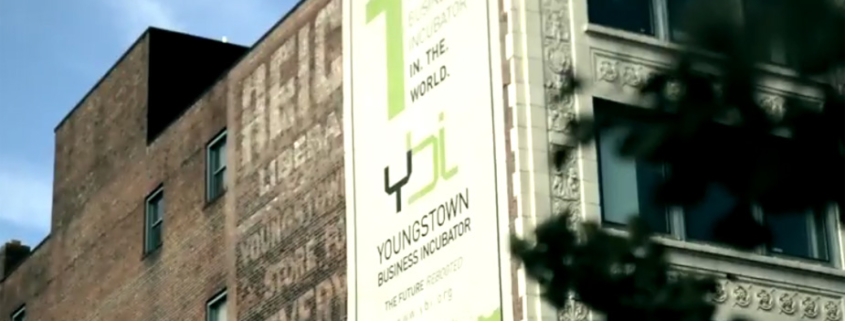The Trip of Impact – A Reflection from Barb Ewing
The experience of going to Montgomery, Alabama and the National Memorial for Peace and Justice was a watershed event for the Youngstown Business Incubator. The fact that we were there just days before the anniversary of Dr. Martin Luther King’s “I Have A Dream” speech made the entire experience event more impactful for us. The fact that we didn’t realize until after we returned that the anniversary was near is a marker to how little we know of our own history, as well as how little the city of Montgomery has embraced its history of civil rights.
It’s probably important to give some demographics of the staff who went on the trip. All but one full-time employee and one part-time (who is still a YSU student) participated. Of those, five are African American and seven are white; and seven women and five men.
In the last year, YBI’s commitment to diversity and inclusion has increased dramatically. A year ago, we had two full-time Minority Business Assistance Center staff. Today, we have five full and part-time African American employees serving minorities, veterans, women, and economically distressed populations.
At our heart, I believe that our staff sees itself as open and affirming and free from overt racism. We tend to hire people who are liberal and open-minded. We consciously think about issues of representation and diversity when we are hiring, filling board seats, etc. In essence, we viewed ourselves as an enlightened organization that is working to make the lives of minorities – and in particular, African Americans, better.
While I believe that to be generally true, what we didn’t understand was just how pervasive discrimination and inequality has been in our society and how deep the hole is that Black America had (has) to dig out of. We have previously done some diversity training through the Racial Equity Institute (REI), but the information that we gained was “bloodless”. It was very data-driven and included interesting discussions, but it didn’t change anyone’s heart. In truth, it left most people feeling (a) frustrated at being out of the office for so long or (b) guilty for their white privilege.
Seeing the memorial and reading and hearing the stories of both the lynching victims and incarcerated men and women had a profoundly different impact on our staff. As one employee put it, “I live in a world that unless something impacts me directly, it just exists on my periphery, I don’t let the information ‘in’. This was different. This makes me realize that I need to go home and talk to my son to make sure that he understands our history and what it means to be Black in America.”
In other instances, the overt racism that still exists in the United States slapped us in the face. A number of our white staff commented on the fact that Alabama still has laws in place that formally allow for segregation – and that two efforts to overturn them have failed since 2000. Like most Americans, our staff wants to see our country in the best light; we want to believe that we’re always the good guys wearing the white hats. The fact that such egregious racism is still allowed to exist only underscores the economic and social challenges that the entire experience highlight. We do not yet live in a country where every man and woman is born equal and has equal opportunity. As Northerners, it’s easy to point our fingers at the South and view it as their unique heritage and problem. But this trip made us realize that institutional racism still exists in the United States, and suddenly, the REI training that we did previously started to come to life for us in a very different way.
In some instances, the insights that we gained were very personal and had little to do with the Memorial and Museum itself. We hired a facilitator to help us process our experience and come to a better understanding of how to take what we learned back home. During that conversation, one of our African American women, S, started to cry when talking about her two sons, and the fear that she has for them both. With police violence still a largely unaddressed problem in the US – as well as Black on Black violence, the rise of hate crimes, etc., Black men, in particular, seem to be at risk, regardless of their socio-economic status. We have known and loved S for years, and have always thought of her as simply a person of color living in an otherwise middle-class world. Her fears are so deep and pervasive that they moved us to tears and made us see the world through her eyes, even if just for a moment. I don’t think any of us understood that socioeconomic status does not alter one’s “blackness”, nor does it keep your children safe. Our problems and challenges transcend social status. Simply creating economic opportunities for people of color is not a silver bullet to eliminate racism in our society.
C, who is also African American shared some of her background with us, and through that, a little of the rage that she feels. It has always been clear that she does not feel fully a part of our staff, but we did not understand the nature of her “separateness”. Words cannot fully capture the difference in her childhood and her perception of herself, as compared to the white majority. At its most fundamental level, we essentially grew up in two different worlds that have little in common. While it was difficult to hear what she was telling us, and will be more difficult to try to address, it is clear that if we are going to have a truly integrated staff, we need to find ways for her to feel that she can trust the rest of us. We need C to be able to believe that we are her allies and that diversity and inclusion are not simply catchwords for us. And that means that we need to be different, not her.
Our younger staff seemed particularly struck by the stories of the incarcerated prisoners. No one understood the harsh reality of trying to visit a loved one in prison, with the requirements of strip searches, etc. M, who is very close to his family told us that the Department of Justice’s efforts to keep families from visiting “absolutely horrified” him. He now sees that those processes are deliberately made to tear families apart. The telephone booths were where most of our staff had the most emotional response. The stories that the inmates told about how they got there and the crimes that they committed were heart-wrenching. Listening to them and looking at their faces turned a vague concept of “social injustice” into a concrete concept that is as hard and brutal as the prisons themselves.
Everyone walked away from the monument with something different striking them. For some, it was the magnitude of violence in certain counties. For others, it was the anonymity of the victims: nameless, faceless souls who are lost to time and space. Still others, it was the triviality of their “crimes”. Or the hundreds of jars of different color earth representing the lives – and skin tones – of the men and women who died unjustly. For me, it was the monuments that are laid down flat, waiting for their communities to claim them.
As a team, we also did some other tours, including a trolley tour of Montgomery. The tour guide was fabulous, conveying more than just facts, but an actual sense of what life was – and is – like. She was able to bring the city’s history to life, as well as to candidly discuss the climate that continues on to this day. She took us to see new businesses, started by women or minorities, who are actively working to create a new reality in Alabama. On a trip that was heavy with the weight of the past, she was a light in the darkness. In her, the ongoing fight for civil and economic rights continues.
There were a million other moments as well: Seeing the statue of the slaves in their shackles at the monument and the rage, desolation and destruction it conveyed. The emotions that can still be felt in the entrance to the Museum when you realize that you’re standing in a room where slaves were held. Walking the streets where black families walked during the bus boycott and thinking about them doing it in all weather. Sitting in a chair from Dr. King’s office building. Standing in the square where the slaves were sold. A thousand fragments of different memories that come together to form a picture of who we were, who we are, and who we need to be.
Which leads to the next steps. We want this trip to be catalytic for not only YBI, but also our community. Right now, we don’t have a lot of answers. Our new Minority Business Assistance Center (MBAC) Director reminded us of a quote from President George Bush to talk about the “soft bigotry of low expectations.” All too often, MBAC clients are working on traditional “lifestyle businesses”, with no thought of creating something larger. Somehow, we have to find ways to better integrate our technology entrepreneurship programs with our MBAC program.
While that sounds easy and intuitive, the truth is that funding silos are hard to break down. We also need to find other ways to serve the minority community, whether that’s developing workforce training programs or high school internships, what we’re doing isn’t enough. Some of that work began on the way back from Alabama, in response to a funding application with a very quick turnaround. And, as Carmella noted, “if you want Black girls in your programs, you need to go talk to Black girls.” We have not been intentional enough about our outreach efforts, and it provides us with lots of room for improvement. As we start updating our strategic plan next year, we will begin integrating questions of race and equity more deeply into our work.
But there’s also a larger systemic question that we also need to answer. It’s a question that is vaguer, and harder to get our arms around. As I mentioned above, YBI sees itself as a diverse organization, or at least one that aspires to be. But, it seems that the economic issues faced by African Americans are secondary to the pervasive and systemic racism that still exists in our society, especially in communities like Youngstown. We need to find ways to break down social and emotional barriers in order to move beyond where we are as a community. One of our employees said it best in her reflection on the trip, “Injustice isn’t something we look back on in history and wish we could change, but is rather something taking place today, that we have the power to change.”

